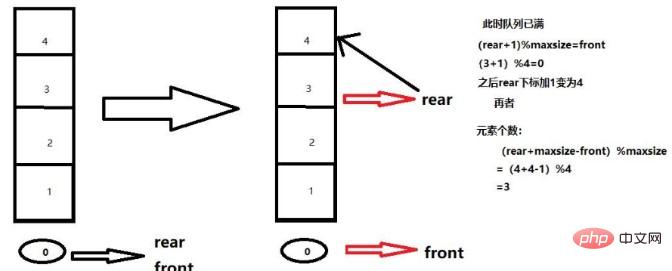How to implement queue entry and exit in java

First define several variables and arrays:
a: Array representing the queue
rear: Represents the tail of the queue, initialized here to 0
(the subscript of an element is moved one position backward when it is added to the queue)
front: Represents the head of the queue, also initialized It is 0
(when an element is dequeued, the subscript moves back one position)
maxsize: The maximum subscript, initialized to 4 here, but the queue can only store 3. (The length of the queue plus one)
A position reserved in the array is used to determine whether the queue is empty or full.
Java related video recommendations: java video tutorial
Refer to the picture below for easy understanding:

At this time The number of elements is 3, which is already full, because the number of arrays is the number of valid elements plus one.
Note: The element subscript can only be 0-3
The example code is as follows:
//数据结构——队列
import java.util.Scanner;
public class Queue {
int[] a ;
int rear;
int front;
int maxsize;
public static void main(String[] args) {
Queue queue = new Queue();
Scanner scan = new Scanner(System.in);
int i;
do {
System.out.println("请输入:1入队 2出队 3查看 0退出");
i = scan.nextInt();
switch(i) {
case 1:
System.out.println("请输入要入队的元素:");
queue.addQueue(scan.nextInt());
break;
case 2:
queue.exitQueue();
break;
case 3:
queue.showqueue();
break;
}
}while(i!=0);
System.out.println("退出成功");
}
//构造函数
public Queue(){
a = new int[4];
rear = 0;
front = 0;
maxsize = 4;
}
//判断队列是否为空
public boolean judgeNull() {
return rear == front;
}
//判断队列是否已满
public boolean judgeFull() {
return (rear+1) % maxsize == front;
}
//入队
public void addQueue(int num) {
//判断,若队列已满则结束,不满则将其添加
if(judgeFull()) {
System.out.println("队列已满");
return ;
}
a[rear] = num;
rear = (rear+1) % maxsize;
}
//出队
public void exitQueue() {
//判断,若队列为空则结束,非空则将其最前的元素取出
if(judgeNull()) {
System.out.println("队列为空");
return ;
}
front = (front+1) % maxsize;
}
//显示队列的元素
public void showqueue() {
if(judgeNull()) {
System.out.println("队列为空");
return ;
}
for (int i = front; i < front+count(); i++) {
System.out.printf("a[%d] = %d\n",i%maxsize,a[i%maxsize]);
}
}
//求出队列的有效个数
public int count() {
return (rear+maxsize-front)%maxsize;
}
}If you want to learn more java related knowledge, you can visit: java Getting Started Tutorial
The above is the detailed content of How to implement queue entry and exit in java. For more information, please follow other related articles on the PHP Chinese website!

Hot AI Tools

Undresser.AI Undress
AI-powered app for creating realistic nude photos

AI Clothes Remover
Online AI tool for removing clothes from photos.

Undress AI Tool
Undress images for free

Clothoff.io
AI clothes remover

AI Hentai Generator
Generate AI Hentai for free.

Hot Article

Hot Tools

Notepad++7.3.1
Easy-to-use and free code editor

SublimeText3 Chinese version
Chinese version, very easy to use

Zend Studio 13.0.1
Powerful PHP integrated development environment

Dreamweaver CS6
Visual web development tools

SublimeText3 Mac version
God-level code editing software (SublimeText3)

Hot Topics
 1377
1377
 52
52
 Perfect Number in Java
Aug 30, 2024 pm 04:28 PM
Perfect Number in Java
Aug 30, 2024 pm 04:28 PM
Guide to Perfect Number in Java. Here we discuss the Definition, How to check Perfect number in Java?, examples with code implementation.
 Random Number Generator in Java
Aug 30, 2024 pm 04:27 PM
Random Number Generator in Java
Aug 30, 2024 pm 04:27 PM
Guide to Random Number Generator in Java. Here we discuss Functions in Java with examples and two different Generators with ther examples.
 Weka in Java
Aug 30, 2024 pm 04:28 PM
Weka in Java
Aug 30, 2024 pm 04:28 PM
Guide to Weka in Java. Here we discuss the Introduction, how to use weka java, the type of platform, and advantages with examples.
 Smith Number in Java
Aug 30, 2024 pm 04:28 PM
Smith Number in Java
Aug 30, 2024 pm 04:28 PM
Guide to Smith Number in Java. Here we discuss the Definition, How to check smith number in Java? example with code implementation.
 Java Spring Interview Questions
Aug 30, 2024 pm 04:29 PM
Java Spring Interview Questions
Aug 30, 2024 pm 04:29 PM
In this article, we have kept the most asked Java Spring Interview Questions with their detailed answers. So that you can crack the interview.
 Break or return from Java 8 stream forEach?
Feb 07, 2025 pm 12:09 PM
Break or return from Java 8 stream forEach?
Feb 07, 2025 pm 12:09 PM
Java 8 introduces the Stream API, providing a powerful and expressive way to process data collections. However, a common question when using Stream is: How to break or return from a forEach operation? Traditional loops allow for early interruption or return, but Stream's forEach method does not directly support this method. This article will explain the reasons and explore alternative methods for implementing premature termination in Stream processing systems. Further reading: Java Stream API improvements Understand Stream forEach The forEach method is a terminal operation that performs one operation on each element in the Stream. Its design intention is
 TimeStamp to Date in Java
Aug 30, 2024 pm 04:28 PM
TimeStamp to Date in Java
Aug 30, 2024 pm 04:28 PM
Guide to TimeStamp to Date in Java. Here we also discuss the introduction and how to convert timestamp to date in java along with examples.
 Create the Future: Java Programming for Absolute Beginners
Oct 13, 2024 pm 01:32 PM
Create the Future: Java Programming for Absolute Beginners
Oct 13, 2024 pm 01:32 PM
Java is a popular programming language that can be learned by both beginners and experienced developers. This tutorial starts with basic concepts and progresses through advanced topics. After installing the Java Development Kit, you can practice programming by creating a simple "Hello, World!" program. After you understand the code, use the command prompt to compile and run the program, and "Hello, World!" will be output on the console. Learning Java starts your programming journey, and as your mastery deepens, you can create more complex applications.




